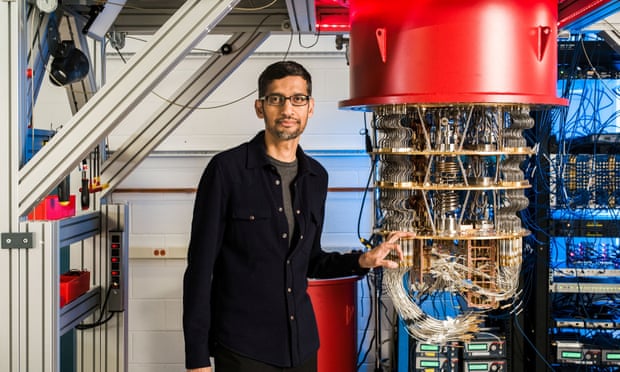
Google claims but IBM disagrees
Google claims but IBM disagrees. Sundar Pichai, pictured with the Sycamore Quantum processor, compared the feat to building the first rocket to reach space. Photograph: Reuters
Task that would take most powerful supercomputer 10,000 years ‘completed by quantum machine in minutes’
For Google, it was a historic announcement: a declaration that it had won the race to achieve “quantum supremacy” – the moment that a sophisticated quantum computer performed a task that stumped even the most powerful standard computer in the world.
But for all the fanfare, which saw Google’s CEO, Sundar Pichai, compare the feat to building the first rocket to reach space, the claim has sparked a bunfight. The tech firm’s rival, IBM, was swift to dismiss the excitement. Google has not, it asserts, achieved the highly prized goal of quantum supremacy.
Google published its claim in the journal Nature on Wednesday after an earlier report on the work appeared briefly on a Nasa website last month. The paper describes how a team led by John Martinis, leader of the research team working on quantum supremacy, built a superconducting quantum processor named Sycamore that harnesses the weirdness of quantum physics to crunch through thorny problems.
To demonstrate the device’s computational prowess, the scientists set it the deeply contrived task of checking the randomness of a sequence of numbers. What the quantum computer rattled through in three minutes and 20 seconds would keep the world’s most powerful supercomputer at Oak Ridge National Lab in Tennessee busy for 10,000 years, they claim.
“This experiment was kind of hard to do,” said Martinis. “When we proposed it in the group, people took a while to understand and get this to work.”
But get it to work they did. Writing in the journal, the authors state: “To our knowledge, this experiment marks the first computation that can be performed only on a quantum processor. Quantum processors have thus reached the regime of quantum supremacy.”
Not so, say the IBM researchers. In a blogpost written in response to the work, they argue that the Oak Ridge supercomputer could solve the randomness problem in 2.5 days, perhaps less, depending on how it was programmed. They add that because “quantum supremacy” requires a quantum computer to solve a problem that is beyond a classical computer, Google’s claim does not hold up.
“Google’s experiment is an excellent demonstration of the progress in superconducting-based quantum computing,” the IBM scientists argue. “But it should not be viewed as proof that quantum computers are ‘supreme’ over classical computers.”
Standard computers and quantum computers are radically different. While standard computers perform calculations with “bits”, which must be either 0 or 1, quantum computers have “qubits” that can take any value between 0 and 1. Another quirk of quantum physics allows qubits to be “entangled” such that the value of one is tied to the values of those around it. Make a quantum computer that is stable enough – a tough enough feat in itself – and it can, in principle, explore multiple solutions to a problem at once.Advertisement




